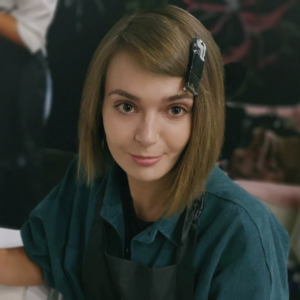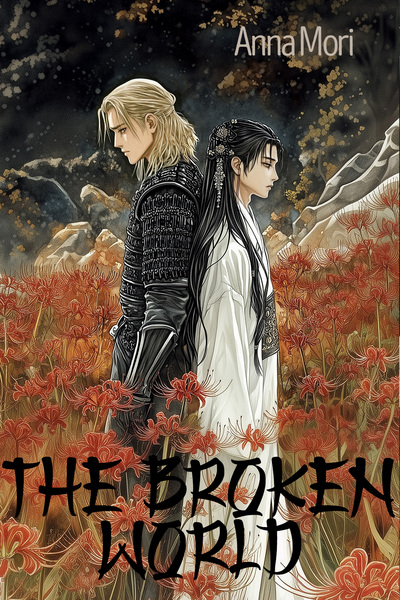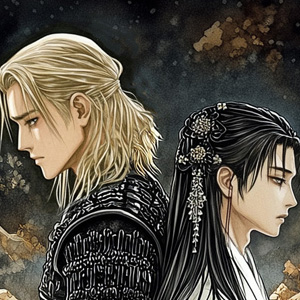One such exchange he overheard near the library wall, in a rarely frequented corner of the garden.
Two men were speaking. Yuki thought he recognized the deep voice of one of them: it belonged to the elderly General Nakatomi.
“Were you with His Majesty today when he fell ill?”
“Yes. I was the one who summoned the physician.” A pause, as though the speaker hesitated, unsure whether to confide further. But at last, he continued. “I don’t mean to alarm you, but it’s far more serious than most in the court believe.”
“That’s hardly surprising. He is no longer young. We must begin preparing for the inevitable… May I ask how you see our future?” The first speaker’s tone was cautious.
“Bleak,” the other replied curtly, followed by a dry laugh. The sound of it — and the speaker’s apparent habit of finding humor in the most inappropriate moments — struck Yuki as familiar. He wasn’t certain, but he suspected it was Lord Mitsune, the head of the imperial archives.
“I, for one, am bracing myself for exile to the provinces,” the archivist continued — or so Yuki assumed it was him. “I’ll consider myself fortunate if I arrive alive and with all the limbs I was born with.” Another laugh. “You know as well as I do, Minister Ise-no-Akahito has no love for me.”
“Are you truly so afraid of the Left Minister? I doubt he would dare banish anyone from the capital, even after the Emperor…”
A pause, which the second speaker broke, his tone tinged now with faint irritation:
“You have nothing to fear. Your family has always been but a single step removed from the Dragon Throne itself.”
“That step is wider than an abyss.”
“A pity — many would rejoice to see you upon that treasured seat, my friend.”
“Enough of that. If you truly thought it a possibility, you wouldn’t be speaking so freely to me. My father ensured I chose a military career precisely to keep me clear of the throne’s intrigues.”
“Wise of him,” the archivist chuckled again. “And what do you make of our future, General?”
“The Left Minister troubles me as well,” Nakatomi admitted cautiously. “Not for my own sake, but no one man should wield so much power. Unless, of course, he is the Son of Heaven.”
“Oh, but we have two prospective Sons of Heaven,” the archivist quipped with a bitter edge. “A madman and a cruel madman — which do you prefer?”
“Comments like that could easily cost you a limb or two,” Nakatomi warned. “I see intelligence in Prince Yukinari — and kindness, too.”
“Intelligence?” The laugh this time was sharper, almost mocking. “Perhaps. But he’s long lost himself in the labyrinth of his own mind. A physician would serve him better than a tutor.”
“All the better, then — if Yukinari ascends to the throne, he’ll let us do our work unhindered. He can go on playing with his toys and painting his dragons.”
“That would be ideal. But I doubt he’ll live long. And his brother…”
“Enough. Quiet. I have no desire to share poor Kiri’s fate.”
“It would be amusing to pit the boy against Minister Akahito.”
“I doubt that can be arranged. Akahito has already ingratiated himself with their mother and will soon find a way to do the same with her son. It’s hardly a challenge — all Akahito needs to do is show deference and indulge Yukiyoshi’s cruel whims. Like attracts like.”
(The Left Minister Ise-no-Akahito and their mother? Yuki had no idea what they meant.)
“As Emperor, he could prove dangerous to us — twice as dangerous with Akahito’s backing,” the general murmured quickly, his voice dropping lower.
“That’s why I’m saying: prepare for the inevitable. Save your money, pack your things. Don’t look at me like that — I have no idea what should be done. All I can manage is to make unfunny jokes… Fine. Someone must deal with them — is that what you wanted to hear?”
“With both of them? The minister and the boy?”
“But who would dare?”
A pause. And then, so quietly that Yuki barely caught the words, the archivist muttered:
“Poor Ryukoku…”
The idea that the real — unimagined — Land of the Dragon might need help as much as his imaginary one was new and unexpected for Yuki. Until now, it had never occurred to him to compare his former life in Yuigui to his current existence in the palace at Shinju. The differences in status and surroundings were simply too vast (though in both lives, he had hidden from the world in his fantasies, as if retreating into a shell). But now, belatedly, he realized something unpleasant: his new homeland was an unhappy, impoverished, backward, and cruel country. He tried to think about this as little as possible because whenever he did, it hurt him in every way — from the separation from his mother and sister (whom he had never particularly loved, but the inability even to see them felt cruelly unfair) to the daily humiliations of court rituals, like the three prostrations required of courtiers before they could petition the Emperor or Crown Prince.
When he realized that among these courtiers were people he genuinely liked, he wanted to free them from this obligation — to approach them, take their hands, lift them to their feet, and speak to them as equals. But he could do none of this. The same absurd court etiquette demanded that he remain silent, wait, and endure.
From the snippets of conversations he overheard, a grim mosaic began to take shape — Yukinari was coming to understand that the palace was steeped in lies, malice, and betrayal. Beyond the palace gates, the city and the country were worse still. The scraps of information he gleaned about the lives of common folk were so cruel and absurd they defied comprehension.
He thought to himself that a world in which such a way of life was accepted simply could not, should not exist.
With warmth and sadness, he began to recall Yuigui and realized that life there had not been as awful as it had seemed when he was a child, lost in his sorrows and loneliness, blind to everything around him.
To comfort himself, he tried to retreat into his imaginary Land of the Dragon, a world whose order was, of course, wise and just. But even there, things had begun to grow worse and worse.
The war continued, and it was becoming clear that they would not hold out. The enemy drew closer to the capital — until finally, they seized it. Yuki tried to imagine himself bravely infiltrating the enemy camp and slaying all the key strategists, leaving the invaders' army helpless. But he couldn’t think of a way to craft a happy ending for this story: the enemies captured him and took him prisoner. His comrades — his friends — refused to abandon him, attempting a daring rescue, but soon they too were surrounded by the invaders. The enemy forces were endless; his friends, just a handful.
Once, long ago, when he created the Land of the Dragon for joy, he controlled everything that happened there. Now, things were different. Everything unfolded on its own, against his will. Of course, it was all still in his mind (he was aware they were fantasies, though they felt more vivid than reality), but it would have been a lie to say he enjoyed conjuring all this suffering, death, and despair. It simply happened that way.
They fought to the death, his friends, in that final battle.
It was as if he were reading a book or hearing someone else’s story — one of those dreams you see just before waking. He tried to intervene, to imagine better twists of fate, but he couldn’t. Whenever he attempted to alter the events for the better, he felt an overwhelming falseness in what he created, and he couldn’t even force himself to picture it clearly. His mind buzzed with stray thoughts, like the noise of distant voices, interfering with his imagination.
So all he could do was watch helplessly as his friends fell, one by one.
Fai Faen died first — he respected life too much to take it, even from an enemy, and chose instead to give up his own.
His best friend, Dan, was surrounded by enemy soldiers. Someone knocked his weapon from his hands, and he, master of fire, ignited like a candle, taking everyone nearby with him. Only a handful of ash remained.
The winged girl swooped down on the enemy like a black whirlwind, striking terror into their hearts. But as her wings grew heavier with arrows, her strength waned. At last, her wings hung limp like tattered banners; she hovered in the air for a moment before plummeting to the ground. Her wings bent grotesquely beneath her, breaking under her weight, becoming a bloody mess.
Snow began to fall, slowly blanketing the Land of the Dragon.
The invisible boy darted among the soldiers, a ruthless god of death. But when the snowflakes began to fall, the enemy saw his silhouette, tracing his movements. He was invisible, yes, but not invincible.
Yuki’s fiancée, Lunhe, tried to shield him from a blade meant for him. The brutal strike intended for Yuki struck her instead. She gasped, closed her eyes, and sank to the ground, her face serene and almost happy.
But her sacrifice was in vain because the next blow was meant for him. He couldn’t block it and fell, clutching at the wound that gushed blood in rhythmic spurts — so much pain, unbearable pain...
He managed to see Mika, fighting the fiercest of them all, fall last. Two arrows pierced her chest, and one struck her neck. She collapsed, arms outstretched. Her pearly hair blended with the whiteness of the snow, and he waited in horror for a crimson stain to spread beneath her. But Mika’s lips moved silently before her final breath — she stopped time…
Everything slowed, as if underwater, and then froze entirely.
Only the snow continued to fall, blanketing the bodies of the fallen.
Yuki hated himself for imagining such a thing. He wanted to undo it all, to save his friends, to end the war. But he couldn’t. He could see the cold, soft, white flakes so clearly, settling on the ground, on the lifeless bodies and faces of his friends —friends who were far more real to him than anyone in the life that surrounded him now, the only life left to him.
In the second Ryukoku, the one his mind stubbornly called real, though his heart screamed otherwise, there was no war, no deaths. But here, as there, he was alone, and everything else was just as cold and unreal, as if covered in snow or submerged underwater.
But this world was different from his imagined one in one crucial way: in his own Land of the Dragon, life had stopped, but here it went on. And though everything in this world was dull, ugly, and wrong, it unsettled him, confused him, demanded his involvement — or at least some opinion — and wouldn’t let him rest.
It wasn’t that he began to feel affection for this real Ryukoku or wanted to help anyone. Truly, he wanted only one thing: to reclaim his world.
But that, of all things, was beyond his power.
The practice of beating servants with sticks for even the smallest infractions was one of the many things Yuki despised about the Ryukoku palace. He couldn’t abolish punishments entirely — not yet, anyway. For one, he vaguely understood that doing so would upset some deep-rooted traditions, pillars that were far larger and more significant than just the system of punishments. And for another, he wasn’t the emperor yet. In the palace, he was — at least in his own eyes — nobody, despite the threefold bows and all the other rituals performed before him.
But he could, at the very least, influence Yukiyoshi. He was older than his brother, and when Yukiyoshi once again issued an absurdly cruel punishment, Yuki finally said:
“No.”
It had taken him a long time to gather the courage to say even that single word, to say anything at all. And he was almost startled when Yukiyoshi obeyed. His younger brother turned to him, his expression a mix of astonishment and anger.
“Why are you interfering in my affairs?” Yukiyoshi asked, his voice low.
“Because everything that happens in this palace concerns me, too. And I am asking you to stop.”
“Stop what? Punishing people for their mistakes?”
“Stop being cruel. I forbid it.”
“You... forbid it?” Yukiyoshi let out a derisive laugh. “Go on, brother. Run off and play while you still can. Climb your trees, draw your maps, slay your imaginary monsters. What makes you think you can forbid me anything?”
His outright scorn infuriated Yukinari, and though Yukiyoshi still frightened him, he now felt a little more certain of himself. His voice rang out, firm and loud enough for the onlookers to hear:
“I can forbid you — as your elder brother and the future emperor — and I am forbidding it now. From now on, all your orders will be reported to me.” Turning away from Yukiyoshi, Yuki gave another order, forcing his voice to sound steady:
“Confine him to the tower for two days. He is to have plenty of food and water, but he is not to see or speak with anyone. I think that is a lenient punishment for his insolence.”
As Yukiyoshi was led away, he glanced back, and Yuki saw in his eyes such pure, undiluted hatred that it made his skin crawl. He thought, Yukiyoshi must know I’m afraid of him...
(He told himself he wasn’t afraid anymore, but it was a lie.)
Yukiyoshi remembered the lesson well.
Knowing his brother, Yukinari had a sense of what would happen next. What he didn’t expect was how quickly it would happen — or how openly Yukiyoshi would show his feelings.
Yukinari now needed to be more careful. He had always thought of himself as invisible, almost like his invisible friend from the Dragon Kingdom. And an invisible boy has nothing to fear. But the moment he proved he wasn’t invisible, that he was someone, he became vulnerable — and he knew it.
But old habits were hard to break. It was his own fault he had no guards with him. He loved wandering alone through the palace’s quieter corners too much.
He was sitting by his favorite little black pond deep in the garden when someone crept up behind him and struck him on the head with a stone. The blow was hard — very hard — but not hard enough. He didn’t lose consciousness, though the pain was so blinding that his vision darkened, and for a moment, he couldn’t think.
Rough hands grabbed him by the collar of his robe, dragged him toward the pond, and shoved him into the water.
He struggled, but the hands were strong, and he was still dazed from the blow. The cold water shocked him back to some awareness. Through the rippling surface — which, seen from below, wasn’t so black but rather a clear greenish glass — he saw the figure and face of Yukiyoshi.
“I’m going to die,” he thought. Strangely, the realization didn’t frighten him. His lungs burned, desperate for air, but his mind remained startlingly clear.











Comments (1)
See all